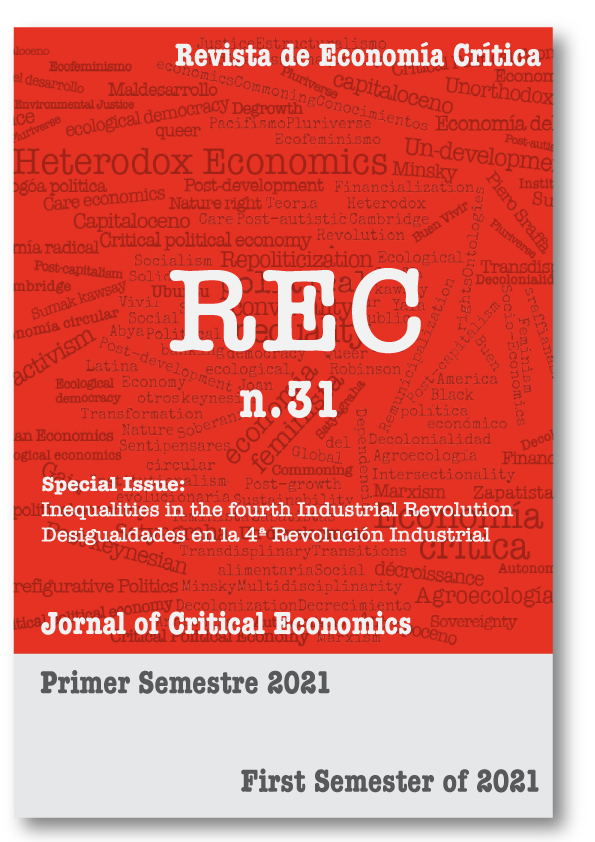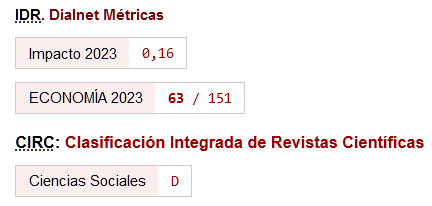Less cooking time, more consumption time: more gender equality?
DOI:
https://doi.org/10.46661/rec.10543Keywords:
time use, domestic work, gender, social habits, consumption practicesAbstract
This paper analyses the gender impact of the fourth industrial revolution on domestic work. It focuses on the symbolic dimension of time use related to the set of cooking tasks. The main hypothesis argues that, beyond technological innovation, the decrease in time devoted to cooking evidenced by the statistics responds to the change in daily habits and consumption model. To explore this question, the paper presents a qualitative methodological strategy to analyse the everyday experience and the meaning attributed to housework tasks according to gender, life cycle and social class. Preliminary results show that decrease of cooking tasks emerge new daily habits characterized by spending more time buying food and less time preparing it. The paper concludes that these daily habits continue to represent more work for women according to their structural conditions.
Downloads
References
Ajenjo, Marc & García, Joan (2014) Cambios en el uso del tiempo de las parejas. ¿Estamos camino de la igualdad? Revista Internacional de Sociología, 72(2): 453-476.
https://doi.org/10.3989/ris.2012.05.28 DOI: https://doi.org/10.3989/ris.2012.05.28
Alemany, Carmen (2001) Les principal aportacions feministes a l'anàlisi de la tecnologia. AsparKía XII: 9-17.
Alonso, Luis Enrique & Fernández, Carlos (2020) Capitalismo y personalidad: consideraciones sobre los discursos empresariales de la rentabilización del yo a través de la marca personal. Política y Sociedad, 57(2):521-541.
https://doi.org/10.5209/poso.65926 DOI: https://doi.org/10.5209/poso.65926
Balbo, Laura (1978) La doppia presenza. Inchiesta, VIII (32): 3-6.
Becker, Gary (1981). A Treatise on the Family. Cambridge, Massachussets: Harvard University Press.
Bianchi, Suzanne (2011) Family Change and Time Allocation in American Families. Annals of the American Academy of Political and Social Science, 638: 21-44.
https://doi.org/10.1177/0002716211413731 DOI: https://doi.org/10.1177/0002716211413731
Borràs Vicent (2007) Las desigualdades en el consumo a través del género. Revista Española de Sociología, 8: 139-156.
Borràs, Vicent; Ajenjo, Marc & Moreno, Sara (2018) More parenting in Spain: a possible change towards gender equality?. Journal of Family Studies. DOI: 10.1080/13229400.2018.1440618
https://doi.org/10.1080/13229400.2018.1440618 DOI: https://doi.org/10.1080/13229400.2018.1440618
Borderias, Cristina; Carrasco, Cristina & Alemany, Carmen (Eds.). (1994) Las mujeres y el trabajo. Rupturas conceptuales. Madrid: FUHEM-Icaria.
Braña, Francisco (2019) A fourth industrial revolution? Digital transformation, labor and work organization: a view from Spain. Journal of Industrial and Business Economics, 46 (3): 415-430.
https://doi.org/10.1007/s40812-019-00122-0 DOI: https://doi.org/10.1007/s40812-019-00122-0
Braveman, Harry (2007) La degradación del Trabajo en el siglo XX. Revista Taller. Sociedad, cultura y política, 24.
Cockburn, Cynthia (1997) Domestic technologies: Cinderella and the engineers. Women's Studies International Forum, 20 (3): 361-371.
https://doi.org/10.1016/S0277-5395(97)00020-4 DOI: https://doi.org/10.1016/S0277-5395(97)00020-4
Díaz Mendez, Cecilia (2005) Los debates actuales en la Sociología de la Alimentación. Revista Internacional de Sociología, 40: 47-78.
https://doi.org/10.3989/ris.2005.i40.189 DOI: https://doi.org/10.3989/ris.2005.i40.189
Díaz Méndez, Cecilia & Garcia Espejo, Isabel (2014) Eating practice models in Spain and the United Kingdom: A comparative time-use analysis. International Journal of Comparative Sociology, 55(1): 24-44.
https://doi.org/10.1177/0020715213519657 DOI: https://doi.org/10.1177/0020715213519657
Domínguez Marta (2015). Parentalidad y división del trabajo doméstico en España 2002-2010. Revista Internacional de Sociologia, 149: 45-64
Durán, María Ángeles (1986) La jornada interminable. Barcelona Icaria.
Dujarier, Marie-Anne (2014) Le travail du consommateur. Paris: La découverte.
https://doi.org/10.3917/dec.dujar.2014.01 DOI: https://doi.org/10.3917/dec.dujar.2014.01
Fernández, Carlos Jesús & Heikkilä, Riie (2011) El debate sobre el Omnivorismo Cultural. Una aproximación a nuevas tendencias en sociología del consumo. Revista Internacional de Sociología, 69 (3): 585-605.
https://doi.org/10.3989/ris.2010.04.15 DOI: https://doi.org/10.3989/ris.2010.04.15
Gálvez, Lina; Rodríguez, Paula & Domínguez, Marta (2010) Género, Trabajos y usos del tiempo en España, dentro del contexto europeo. En: Antonio Villar (ed.) Mujeres y mercado de trabajo en España. Cuatro estudios sobre la discriminación salarial y la segregación laboral. Madrid: Fundación BBVA.
Gershuny, Jonathan (2000) Changing times: work and leisure in postindustrial society. Oxford: Oxford University Press.
https://doi.org/10.1093/oso/9780198287872.001.0001 DOI: https://doi.org/10.1093/oso/9780198287872.001.0001
Gracia, Pablo (2014) Fathers' child care involvement and children's age in Spain: A time use study on differences by education and mothers' employment. European Sociological Review, 30 (2): 137-150.
https://doi.org/10.1093/esr/jcu037 DOI: https://doi.org/10.1093/esr/jcu037
González-Páramo, José Manuel (2017) Cuarta revolución industrial, empleo y estado de bienestar. Real Academia de las Ciencias Morales y Políticas del Reino de España. Madrid.
Hook, Jennifer (2010) Gender Inequality in the Welfare State: Sex Segregation in Housework, 1965-2003. Chicago Journals, 115(5): 1480-1523.
https://doi.org/10.1086/651384 DOI: https://doi.org/10.1086/651384
Kan, Man Yee; Sullivan, Oriel & Gershuny, Jonathan (2011) Gender Convergence in Domestic Work: Discerning the Effects of Interactional and Institutional Barriers from Large-scale Data. Sociology, 45(2): 234-251.
https://doi.org/10.1177/0038038510394014 DOI: https://doi.org/10.1177/0038038510394014
Moreno, Sara (2009) Uso del tiempo, desigualdades sociales y ciclo de vida. Política y Sociedad, 46(3): 191-202.
Moreno, Sara (2017) The Gendered Division of Housework Time: Analysis of Time Use by Type and Daily Frequency of Household Tasks. Time & Society, 26(1), 3-27.
https://doi.org/10.1177/0961463X15577269 DOI: https://doi.org/10.1177/0961463X15577269
Moreno-Colom, Sara; Ajenjo Cosp, Marc & Borràs Català, Vicent (2018). La masculinización del tiempo dedicado al trabajo doméstico rutinario. Revista Española de Investigaciones Sociológicas, 163: 41-58. (http://dx.doi.org/10.5477/cis/reis.163.41)
https://doi.org/10.5477/cis/reis.163.41 DOI: https://doi.org/10.5477/cis/reis.163.41
Parsons, Talcott (1999) El Sistema social. Madrid: Alianza Editorial.
Pérez, Carlota (2010) Technological revolutions and techno-economic paradigms. Cambridge Journal of Economics, 34(1): 185-202.
https://doi.org/10.1093/cje/bep051 DOI: https://doi.org/10.1093/cje/bep051
Prieto, Carlos (dir) (2015). Trabajo, cuidados, tiempo libre y relaciones de género en la sociedad española. Madrid: Ediciones Cinca
Piore, Michael & Sabel, Charles F (1990) La segunda ruptura industrial. Madrid: Alianza Editorial
Sayer, Liana (2010). "Trends in Housework". En: Judith Treas and Sonja Drobnic (eds). Dividing the domestic. Men, Women and Household Work in Cross-National Perspective. California: Stanford University Press.
https://doi.org/10.11126/stanford/9780804763578.003.0002 DOI: https://doi.org/10.11126/stanford/9780804763578.003.0002
Schwart, Ruth (2011) La 'revolución industrial' en el hogar: tecnología doméstica y cambio social en el siglo XX. En C. Carrasco; C. Borderías y T. Torns (eds.), El trabajo de cuidados. Historia, teoría y políticas. Madrid: Ed Catarata.
Scott, Joan (2000) La mujer trabajadora en el siglo XIX. En: G. Duby; P. Perrot (eds). Historia de las mujeres en Occidente.
Treas, Judith (2008) The dilemma of gender specialization: Substituting and augmenting wives' household work". Rationality and Society, 20: 259-282.
https://doi.org/10.1177/1043463108092529 DOI: https://doi.org/10.1177/1043463108092529
Treas Judith & Tai, Tai (2012) How Couples Manage the Household Work and Power in Cross-National Perspective. Journal of Family Issues, 30 (8): 1088-1116.
https://doi.org/10.1177/0192513X11426700 DOI: https://doi.org/10.1177/0192513X11426700
Veblen, Thorstein (1974) Teoría de la clase ociosa. México: Fondo de Cultura Económica.
West, Candace & Zimmerman, Don (1987) Doing Gender. Gender and Society, 1: 125-151.
https://doi.org/10.1177/0891243287001002002 DOI: https://doi.org/10.1177/0891243287001002002
Downloads
Published
How to Cite
Issue
Section
License
Copyright (c) 2021 Sara Moreno-Colom, Vicent Boràs-Català

This work is licensed under a Creative Commons Attribution 4.0 International License.
This licence allows third parties to share (copy and redistribute the material in any medium or format) and adapt (remix, transform and create from the material for any purpose, including commercial purposes), provided that authorship and first publication in this journal (The Journal, DOI of the work) is acknowledged, a link to the licence is provided, and it is stated whether changes have been made to the work.







